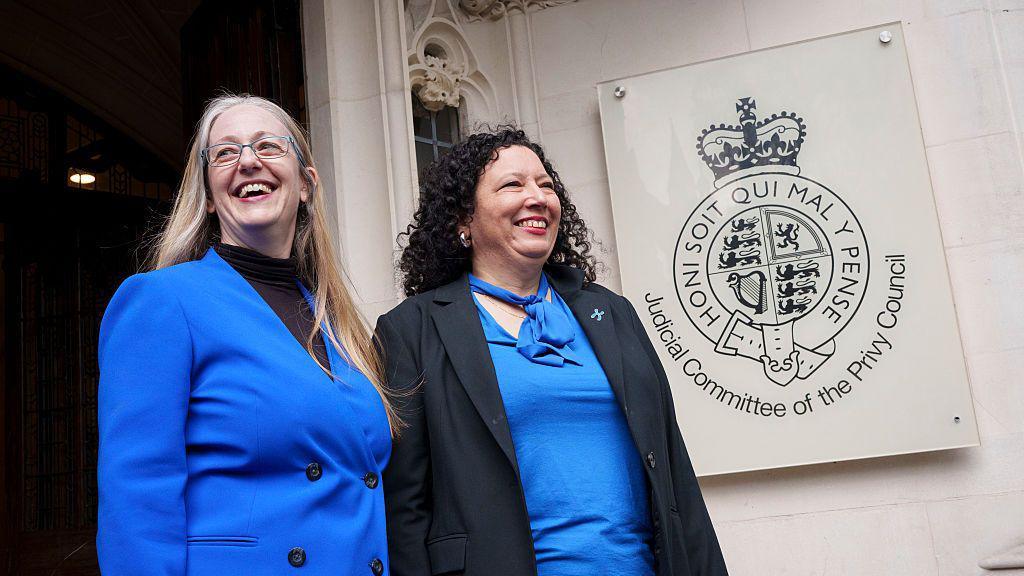Supreme Court ruling has dire consequences for trans people, campaigners warn
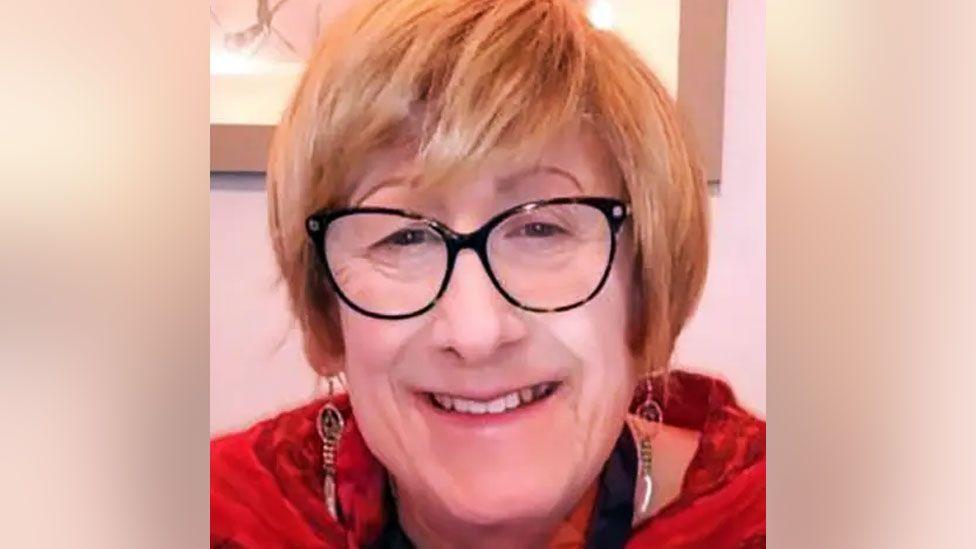
Kerrie Meyer had gender reassignment surgery at the age of 72
- Published
Campaigners have warned the UK Supreme Court's ruling on the definition of a woman could have "dire consequences" for the safety of trans people.
Scottish Greens MSP Maggie Chapman told BBC Scotland News the trans community is now worried that "people are coming after their right to exist" as a result of the ruling.
And Kerrie Meyer, who had gender reassignment at the age of 72, criticised the ruling and said it would set back progress for trans people.
Judges unanimously ruled on Wednesday that a woman is defined by biological sex under equalities law.
Supreme Court backs 'biological' definition of woman
- Published16 April
Women's campaigners celebrate court win - but what will it change?
- Published16 April
The Equality and Human Rights Commission said the decision would result in an updated code of conduct for services, including the NHS and prisons, potentially affecting spaces such as hospital wards, changing rooms and domestic refuges.
The Scottish government had argued that transgender people with a gender recognition certificate (GRC) are entitled to the same sex-based protections as biological women.
But judges sided with campaign group For Women Scotland, which brought a case against arguing that sex-based protections should only apply to those born female.
Kerrie Meyer, who lives in Shetland, argued that the ruling meant that: "At the stroke of pen, the security and well-being of all transgender people, whether now deemed as biological male and female, is in jeopardy.
"The Supreme Court's ruling has created severe implications for all trans people and has failed to take into account the dire consequences and untenable results that will occur."
Kerrie, who is now 77, moved to Shetland from Hastings in East Sussex in 2008 and was founder of the Shetland Islands Pride festival.
She said the rights of trans people had been advanced by the Gender Recognition Act 2004 and the Equality Act 2010, and that she believes the Supreme Court case was motivated by "reserving and maintaining" woman's spaces from trans women, regardless of whether they held a GRC.
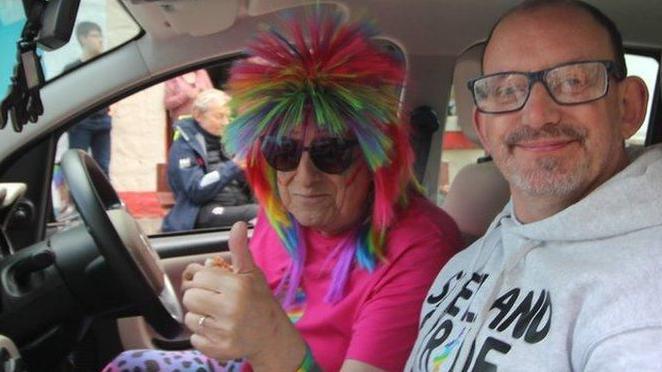
Kerrie Meyer founded the Shetland pride festival
Kerrie told BBC Radio Scotland that it would be "totally and utterly ridiculous" for her to change her behaviour in public, adding: "I was born a man. Under the law I am a woman. I dress like a woman. I act like a woman. And I am a woman.
"If I go to the toilet and there is another woman in there, they don't know whether I have got a gender recognition certificate or not."
Kerrie also believes that recognition certificates should only be granted if someone has undergone gender reassignment surgery.
Under the new ruling, a person who was born male but identifies as a woman does not have a right to use a space or service designated as women only, even if they have legally changed their gender.
Baroness Kishwer Falkner, the chair of the EHRC, said trans people should use their "power of advocacy" to ask for facilities including a "third space" for toilets.
She told the BBC's Today programme: "Single-sex services like changing rooms must be based on biological sex. If a male person is allowed to use, it no longer is a single sex space."
She added the ruling was "a victory for common sense only if you recognise that trans people exist, they have rights and their rights must be respected".
Baroness Kishwer added public bodies like the NHS would be expected to update their advice, and that the EHRC would pursue any organisations which did not.
'Stoking the fires of culture war'
Billie Robertson, a hotel worker from Arran who now lives in Ayrshire, told BBC Scotland News she had been left in shock by the news and was concerned about the impact on day to day life.
She said: "It feels like I've been placed in an 'other' category. The court said transgender rights aren't going to be affected, but there's been no further discussion on 'this is where you can and can't be, so here's alternatives'.
"It just feels like a very definitive statement without any follow-up for the group of people who are affected."
Ms Robertson, 28, said she felt she had regressed within herself after the news as "you do take the opinion of so many people onboard, and you think maybe I am delusional".
However she added she was trying to focus on the small things and the "love and respect" friends and colleagues have shown her.
Scottish Greens MSP Maggie Chapman, a prominent supporter of trans rights, told the BBC's Good Morning Scotland programme the decision would "stoke the fires of the culture war" and trans people now feared they could lose access to facilities they've used, in some cases, for decades.
She said: "The response by For Women Scotland and other associated groups was very, very clear - they are taking this as a victory and that is potentially dangerous about where they go next.
"We've already heard people say they want to repeal the gender recognition act 2004, and trans people are worried that people are coming after their right to exist."
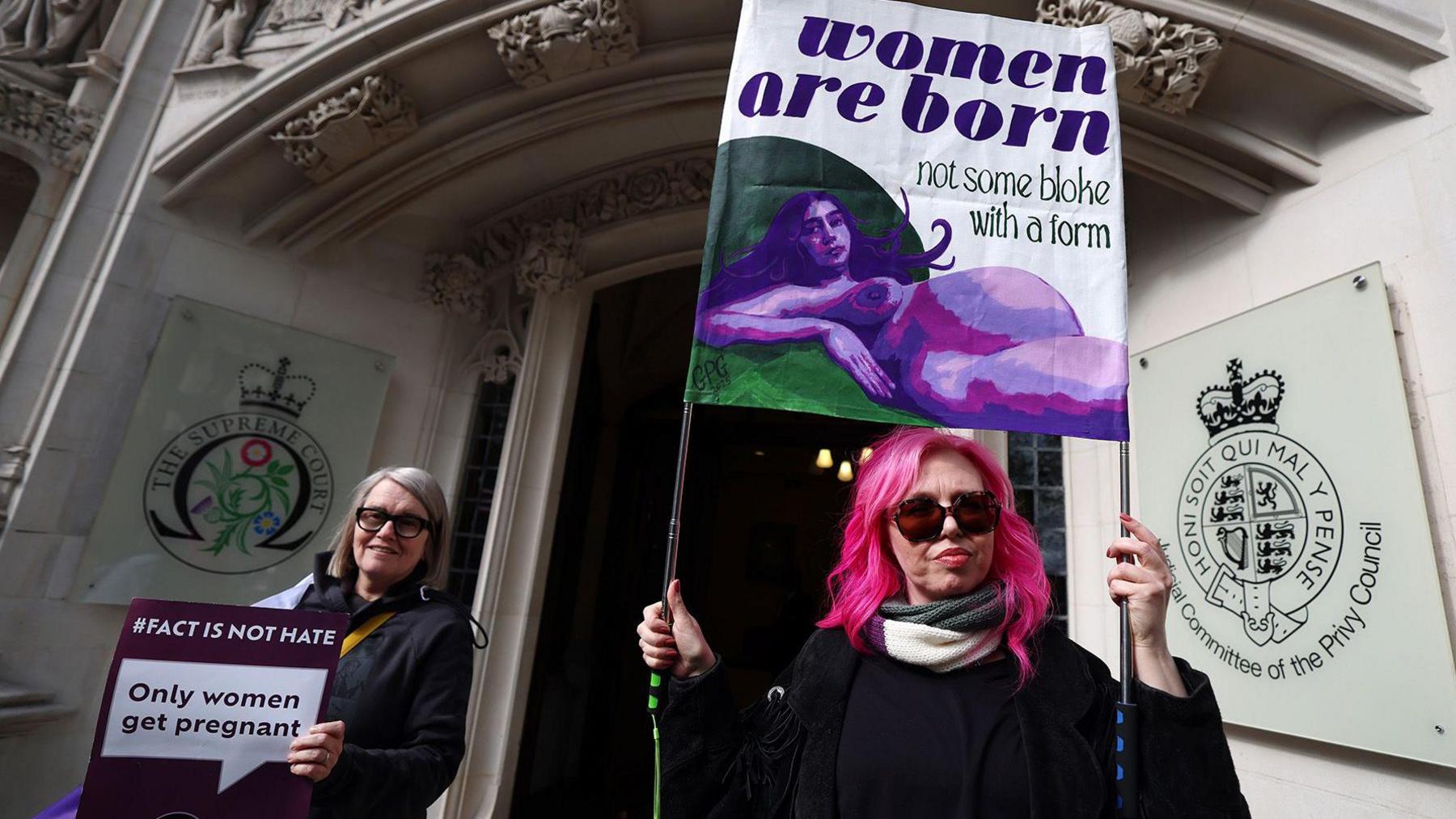
Women's groups argued that sex-based protections should only apply to people born female
However Rachel Hamilton, of the Scottish Conservatives, told Good Morning Scotland the court's decision was " basic common sense" and would being "clarity" to the trans debate.
She said: "The reason we ended up at the Supreme Court is because there was confusion in Scotland. Now we have a clear and unambiguous decision on what is a biological woman."
She said the Scottish government must set out a ministerial statement on how they would move forward with the Supreme Court ruling.
Ash Regan, the Alba party MSP who quit the SNP over the party's stance on gender, lodged a motion in the Scottish Parliament calling for "urgent action" to end self-identification in Scottish hospitals, public bodies, schools and prisons.
She claimed it was a "victory for women across the country" and that current gender self-identification laws jeopardised "the safety, privacy and dignity" of women and girls.
Regan told BBC Scotland News the verdict yesterday was a "humiliation" for the Scottish government.
She added: "The government has been making a mockery of Scotland by going to the Supreme Court to argue that men can be lesbians. They've got to take notice of this - this ideology has taken root across the public sector.
"The government could start [upholding women's rights] today by issuing very clear guidance for the whole of the public sector and they could send out a very strong signal by removing men from the women's prison estate."
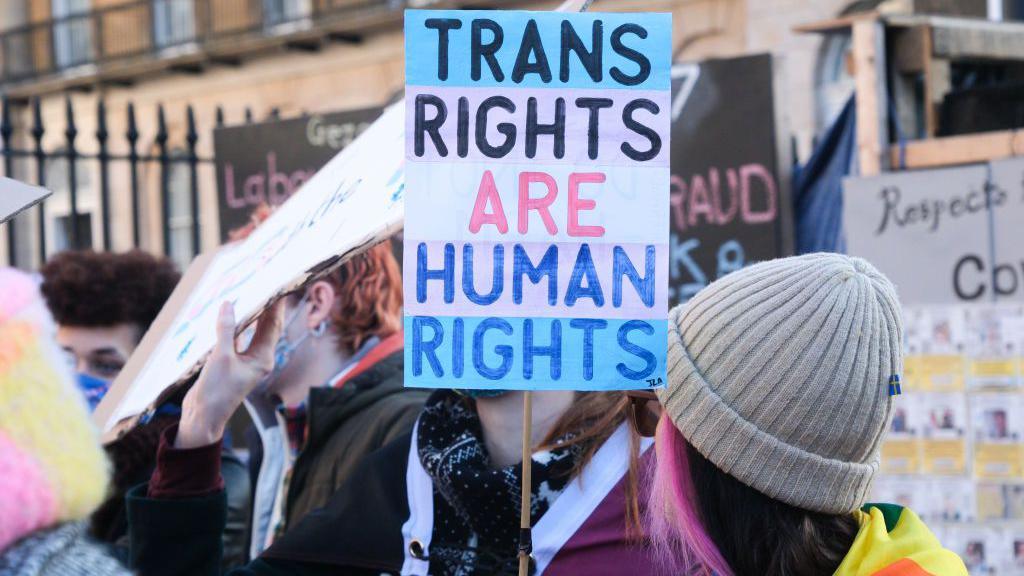
Trans campaigners have criticised the Supreme Court Ruling
An updated code of practice by the EHRC is expected to be laid before Parliament before the summer recess.
The code helps service providers, public bodies and associations to understand their duties under the Equality Act and put them into practice.
The Scottish government's finance minister Shona Robison previously told BBC News the administration would work with the EHRC and the UK government "at pace" on the guidance.
British Transport Police announced that while previously someone with a GRC could be searched by their acquired sex, officers have now been advised that same sex searches in custody would be undertaken by the person's biological birth sex.
- Attribution
- Published16 April

- Published16 April
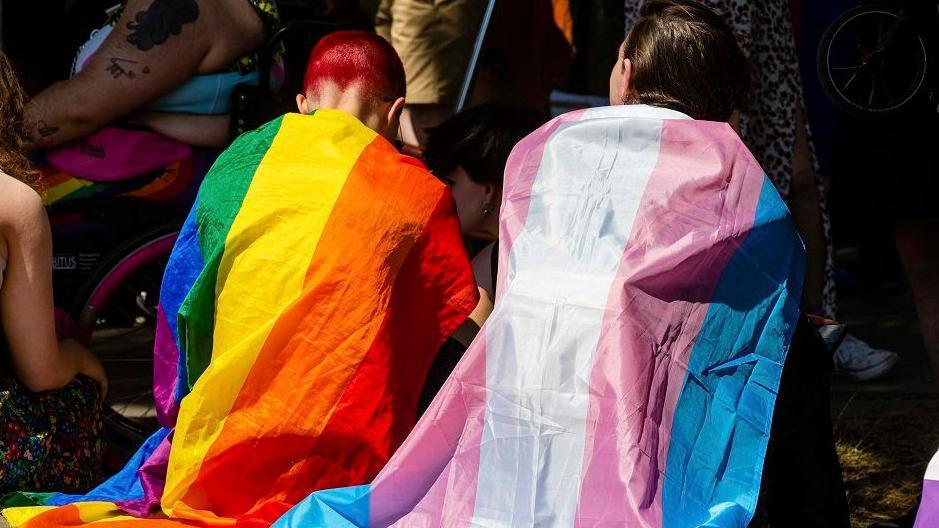
- Published16 April
